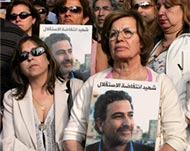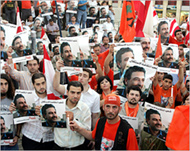Syria assails US ‘smear campaign’
Syria’s UN ambassador has called US accusations that Damascus is interfering in Lebanon a smear campaign and insists that all Syrian intelligence operatives have been withdrawn.

Fayssal Mekdad was responding on Friday to concerns raised by US President George Bush that Syrian intelligence officers were still operating in Lebanon in violation of a UN Security Council resolution demanding the withdrawal of all troops and intelligence operatives.
In comments clearly aimed at the Bush administration, he said the “smear campaign” reflects displeasure at the results of recent elections in Lebanon and is an attempt “to deepen differences between different Lebanese forces, and to create problems for a constructive relationship between Syria and Lebanon”.
Syria has also denied a US charge that it has drawn up an assassination hit list targeting Lebanese political leaders.
Syrian Expatriates Minister Buthaina Shaaban, who often speaks for the government, on Friday said Syria had completely withdrawn from Lebanon and denied that Damascus had drawn up such a hit list in Lebanon.
No history
“Syria never had a history of hit lists… I think they should look somewhere else unless they want to use this as a pretext to target Syria without finding any proof,” Shaaban said.
 |
|
Reports say slain journalist Samir |
“The killings in Lebanon are as much dangerous for Syria than they are for Lebanon and, therefore, it is impossible for Syria to contemplate such a thing,” she told CNN, speaking in English.
Earlier on Friday, the US accused Syria of drawing up a list of Lebanese politicians for assassination.
The accusation by a senior Washington official came on a day when Bush called on Damascus to respond to reports its intelligence agents are still operating in Lebanon.
Shia alliance
The Hizb Allah group and its Shia Amal ally – which have close ties to Syria – won all 23 seats in parliamentary elections in South Lebanon earlier this week.
The US, which considers Hizb Allah a terrorist organisation, expressed concern over the party’s success, saying an armed militia should not have a role in a democratic system.
“We are disturbed that it is foreign governments that are interfering and meddling in the internal affairs of Lebanon, particularly in the Lebanese elections,” Mekdad said.
He said certain circles also want to kill the recent report by a UN verification team which, he said, confirmed that Syria has fully withdrawn its troops, intelligence and assets from Lebanon.
Syria said it completed its pullout on 26 April.
Full withdrawal
A UN military team sent to verify the withdrawal reported on 23 May that all of Syria’s military forces were gone, but said it could not “conclude with certainty that all the intelligence apparatus has been withdrawn” because “intelligence activities are by nature often clandestine”.
When pressed about the team’s refusal to confirm the pullout of intelligence operatives, Mekdad said: “I think what the report said on the nature of these operations is correct.”
|
“We are disturbed that it is foreign governments that are interfering and meddling in the internal affairs of Lebanon” Fayssal Mekdad, |
“We want the team to ensure us if there are no other intelligence services in Lebanon. But what we are sure of in Syria is that we have withdrawn everybody,” he said.
Mekdad was interviewed before UN spokesman Fred Eckhard announced that Secretary-General Kofi Annan has decided to send the verification team back to Lebanon to check reports that Syrian intelligence officials may still be operating in the country. He said no date has been set.
Syrian factor
Syria sent troops to Lebanon in 1976 to quell a year-old civil war but they remained after the war ended in 1990. A Security Council resolution last September demanded a complete Syrian withdrawal of military forces and intelligence operatives.
But it was the 14 February assassination of former Lebanese prime minister Rafiq al-Hariri, and the massive anti-Syrian protests it sparked, that spurred the Syrians to end their 29-year military presence in their smaller neighbour.
Mekdad said Syria “paid a very high price to stop the civil war in Lebanon, and it is in the interest of Syria that Lebanon lives peacefully, and keeps up its territorial and people’s unity”.
The Syrian ambassador dismissed a New York Times story quoting an unnamed administration official as saying the US has received credible information that Syrian operatives were plotting the assassination of senior Lebanese political leaders.
Propaganda campaign
“It’s a propaganda campaign against Syria,” he said.
“We appeal to the international community to face these unacceptable campaigns against Syria because they have nothing to do with the security of Lebanon and its people, and serve only the interests of those who occupy Arab territories and those who support this occupation, and those who want to further complicate the situation in the Middle East”.
Despite the anti-Syria campaigns, he said, “Syria … is ready to continue its dialogue with the United States and other countries on bilateral relations, and to work together for a just and comprehensive peace in the Middle East, instead of such heinous campaigns that do not serve any party”.
 |
|
Syria has rejected accusations it |
Mekdad said many Lebanese leaders “who do not have good relations with Syria,” including former military commander Michel Aoun, “are confirming that Syria has nothing to do with recent developments including the criminal assassination of journalist Samir Kassir”.
Kassir, a prominent Lebanese journalist, who had long advocated Syria’s withdrawal from the country, was killed in a car bombing recently. The opposition has blamed Damascus and its Lebanese supporters for killing al-Hariri and Kassir – which Syria vehemently denies.
“Other intelligence services which are very active in Lebanon, including Israeli Mossad, are fabricating such news and actions to further complicate the situation in Lebanon,” Mekdad said.